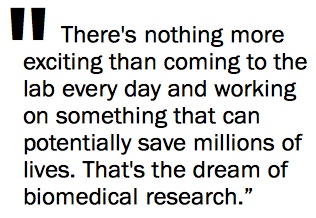
Seattle is the center of the battle against malaria this week, as scientists and global health leaders descend on the region for the second Malaria Forum, organized by the Bill & Melinda Gates Foundation. The meeting comes four years after the first Malaria Forum, where the Gateses issued a challenge to not just control the deadly disease but, over time, to eradicate it.
“What is the most repeated failure in all of global health? It could well be the commitment to eradicate malaria,” said Bill Gates at the time. “So why would anyone want to follow a long line of failures by becoming the umpteenth person to declare the goal of eradicating malaria? There’s one reason. We should declare the goal of eradicating malaria because we can eradicate malaria.”
It was a bold challenge that also raised eyebrows as potentially unrealistic and counterproductive.
Four years later, a report from the Roll Back Malaria Partnership, released as the conference began today, cites progress in a growing number of countries affected by malaria. But an estimated 781,000 people still die from the disease each year.

One of the fronts in the battle against the disease is Seattle BioMed, where researchers have developed a way of genetically modifying the malaria parasite to create a potential vaccine.
We toured the Seattle BioMed lab this morning and heard with researchers including Stefan Kappe, director of the Seattle BioMed malaria program, who talked about the work and the potential to eradicate malaria, and demonstrated (with a group of non-infected mosquitoes) how the researchers are beginning to cautiously test the vaccine in humans.
Continue reading for excerpts from his comments.
Seattle BioMed’s approach: We make the whole parasite into a vaccine. You might know the flu vaccine, which is flu virus which is weakened. You get a shot and that protects you against virulent form of flu. Same principal you get here. We are attenuating or weakening the parasite to a degree that it is not causing infection, but it is still alive, and it can stimulate your immune system in a very potent way, so your immune system knows how to fight off the real parasite when it’s transmitted by mosquitoes.
What excites him about his job: There’s nothing more exciting than coming to the lab every day and working on something that can potentially save millions of lives. That’s the dream of biomedical research. It’s a pleasure and a privilege.
 How mosquitos are helping the research: In the early clinical studies, because we don’t want to manufacture these parasite vaccine strains every time we want to do a vaccine trial, we deliver the vaccine by mosquito bite. It’s cheap. The easiest way to test it is you just let the mosquito do the work. But this is just up to proof of concept. Once we know it protects then we would manufacture it.
How mosquitos are helping the research: In the early clinical studies, because we don’t want to manufacture these parasite vaccine strains every time we want to do a vaccine trial, we deliver the vaccine by mosquito bite. It’s cheap. The easiest way to test it is you just let the mosquito do the work. But this is just up to proof of concept. Once we know it protects then we would manufacture it.
Results so far: We’ve shown in animal studies that it can protect 100 percent, and at very low doses, which is also important. Now we have to see in human studies if that pans out or not, but we are very hopeful because all the animal studies, all the immunological evaluations have shown that this is, right now, the most powerful way of making a malaria vaccine.
On the global battle vs. malaria: Eradication globally means there’s no more malaria parasites in any person or any mosquito. I think it’s realistic, but we need a protective vaccine for it. We have eradicated small pox with a vaccine, we are on the way to eradicating polio with a vaccine. I think we will be able to eradicate malaria if we develop a highly protective vaccine.



